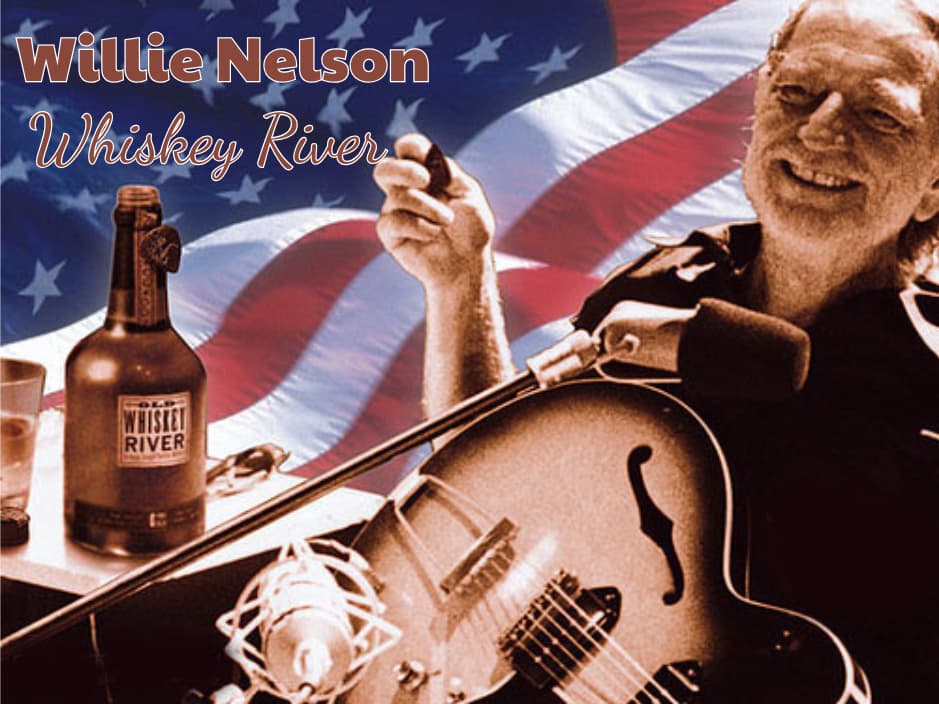
“Whiskey River”: A Timeless Ode to Hardship, Solace, and the Unyielding Spirit of the American Everyman
Ah, “Whiskey River.” Just the name of it conjures up a lifetime of memories for many of us, doesn’t it? It’s a song that drips with the kind of raw, unvarnished truth that only genuine country music can deliver, a testament to the human spirit’s resilience in the face of heartache and hard times. And when you hear it sung by the incomparable Willie Nelson, it takes on an almost spiritual quality, becoming far more than just a tune about drowning sorrows.
Before Willie made it his own, this classic was actually penned by his good friend, the honky-tonk maestro Johnny Bush, along with Paul Stroud. Bush first released “Whiskey River” in 1972, and it found a respectable home on the country charts, peaking at #14 on the Billboard Country Singles chart in 1973. It was a solid hit for Bush, showcasing his knack for writing poignant, relatable tales of the everyman. But when Willie Nelson got his hands on it, something truly transformative happened.
Willie included “Whiskey River” on his seminal 1973 album, Shotgun Willie. This album, a watershed moment in the outlaw country movement, marked a significant departure from his earlier, more Nashville-polished sound. It was raw, authentic, and unapologetically Willie. While “Whiskey River” wasn’t immediately released as a single from Shotgun Willie, it quickly became a fan favorite and, perhaps most notably, a concert staple for Nelson, often serving as his opening song since around 1974. It wasn’t until 1978, when a live recording from his iconic album Willie and Family Live was released as a promotional single, that Willie’s version truly charted, reaching #12 on the US Hot Country Songs (Billboard) chart and #3 on the Canadian RPM Country Tracks. These chart positions, while significant, almost feel secondary to the song’s profound cultural impact and its enduring presence in the hearts of millions.
The story behind “Whiskey River” is as straightforward as its lyrics, which is precisely why it resonates so deeply. Johnny Bush reportedly got the idea for the song while on his tour bus, traveling back to Texas from Nashville. By the time he reached home, the simple yet powerful lines were already flowing. It speaks to that primal urge to escape, to find solace when the world, or more specifically, a broken heart, feels like it’s crushing you. “Whiskey River, take my mind / Don’t let her memory torture me,” Nelson croons, his voice a weathered tapestry of experience and pain. It’s a plea, a desperate cry for release from the relentless grip of remembrance. The river, in this case, isn’t just a metaphor for alcohol; it’s a symbolic current carrying away the burdens of a tormented soul, a temporary baptism in amber liquid that promises, if only for a fleeting moment, oblivion from sorrow. “Whiskey River, don’t run dry / You’re all I’ve got, take care of me.” This line, in particular, highlights the desperate dependency, the last refuge for a heart that feels utterly alone and exposed.
For those of us who have lived a few decades, the sentiments in “Whiskey River” hit close to home. We’ve all known heartache, loss, and those moments when the weight of the world feels too heavy to bear. We’ve seen friends, maybe even ourselves, turn to a vice for a momentary reprieve, a brief swim in a river of forgetfulness. It’s not necessarily an endorsement of a particular lifestyle, but rather an honest acknowledgment of a very human coping mechanism. It’s about finding comfort, however fleeting, in the familiar. The song embodies the rugged individualism and quiet desperation often found in the heartland, a recognition that sometimes, all you have left is your chosen escape.
“Whiskey River” isn’t just a song; it’s an anthem for the bruised and the weary, a timeless reflection of resilience, and the enduring power of a simple melody to articulate complex human emotions. It’s a reminder of a time when country music wasn’t afraid to confront the darker corners of life, delivering truth with every strum of a guitar and every raw, honest vocal. And in the hands of Willie Nelson, it became more than just Johnny Bush’s creation; it became an indelible part of the American songbook, forever flowing through our collective consciousness, a comforting, albeit bittersweet, presence.